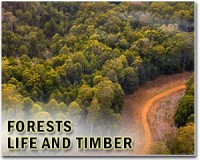| . |  |
. |
Brasilia, Brazil (UPI) Dec 11, 2009 Brazil has a significant role to play in the U.N. climate-change talks in Copenhagen, Denmark, particularly in the Reduced Deforestation and Degradation section. While more than 20 different REDD plans have been proposed, a joint proposal put forward by Brazil and Norway has emerged as a front-runner. Speaking after accepting the Nobel Peace Prize Thursday in Oslo, Norway, U.S. President Barack Obama said, "I am very impressed with the model that has been built between Norway and Brazil that allows for effective monitoring and ensures that we are making progress in avoiding deforestation of the Amazon." Brazil had rejected Thursday an EU proposal for a binding target to cut the rate of deforestation 50 percent by 2020, saying that it would not sign up to any binding targets until it knew how much financial support will be made available by industrialized nations. Key issues surrounding REDD proposals include rights and safeguards for those who live in or depend on the forests; how to measure and verify claims of protection; the future of existing forest industries; and preventing mismanaging of funds. According to the United Nations, burning or cutting trees and undergrowth is responsible for about 17 percent of worldwide emissions. Brazil has one-third of the world's tropical forest area. Since 2003 it has worked to slow the destruction of its forests, creating 250,000 square miles of new protected forest, arresting hundreds of illegal loggers and granting farm loans based environmental standards. Last month Brazil pledged to reduce emissions for 2020 by 36.1 percent to 38.9 percent from current projections. Environment minister Carlos Minc said that slowing Amazon deforestation would generate about half that gain. Existing climate policies don't recognize REDD as an emission-reduction mechanism. Greenpeace says REDD plans would allow countries to "green-wash" their pollution. "REDD can't be used as a permission to pollute," said Paulo Adario, the organization's Amazon campaign coordinator in Brazil, Bloomberg reports. By buying forestry credits, he said, polluters may not have an incentive to cut emissions. Brazilian President Luiz Inacio Lula da Silva, who is expected to join the Copenhagen climate talks next week, has cast himself as a mediator of sorts. To bridge the emissions gap between rich and poor countries, he believes emerging countries should limit pollution and insists that developed nations help pay the bill. "The worst thing that could happen in Copenhagen is that world society thinks its leaders aren't taking responsibility for the seriousness of these problems,'' he said, the Miami Herald reports. Share This Article With Planet Earth
Related Links Forestry News - Global and Local News, Science and Application
 Climate: France at loggerheads with EU allies on forests
Climate: France at loggerheads with EU allies on forestsCopenhagen (AFP) Dec 10, 2009 France clashed with other EU nations Thursday over how to calculate carbon emissions absorbed and emitted by forests, a key component of a climate deal being hammered out at UN talks in Copenhagen. French climate ambassador Brice Lalonde slammed a proposal favoured by countries with huge forestry industries -- especially Finland, Sweden and Austria -- as containing "sloppy, even fraudulent" ... read more |
|
| The content herein, unless otherwise known to be public domain, are Copyright 1995-2009 - SpaceDaily. AFP and UPI Wire Stories are copyright Agence France-Presse and United Press International. ESA Portal Reports are copyright European Space Agency. All NASA sourced material is public domain. Additional copyrights may apply in whole or part to other bona fide parties. Advertising does not imply endorsement,agreement or approval of any opinions, statements or information provided by SpaceDaily on any Web page published or hosted by SpaceDaily. Privacy Statement |